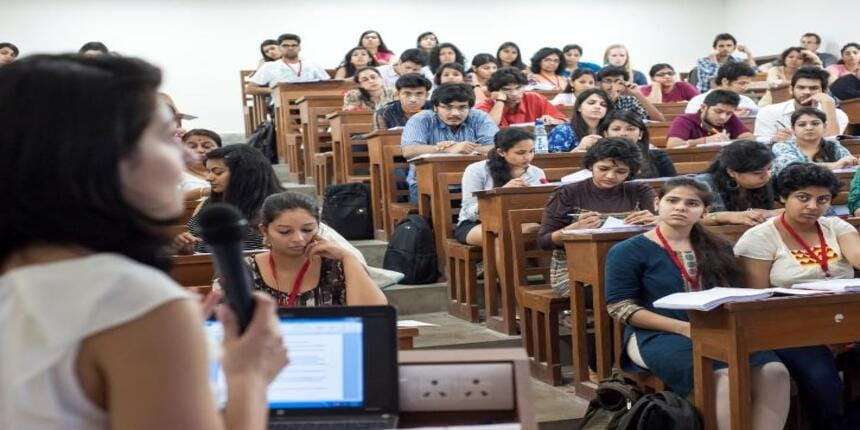Universities UK blueprint flags growing reliance on fee income from foreign students, suggests global strategy
UK universities’ dependence on fees from international students is a systemic challenge; curbs on student, dependent visas a ‘disadvantage’, says report

Pritha Roy Choudhury | October 9, 2024 | 11:12 AM IST
NEW DELHI: The UK government and Universities UK (UUK) recently released a blueprint on the future of the UK’s higher education sector. As university finances continue to worsen and the prospects of a Labour victory in the forthcoming general elections grow stronger, a major review of higher education in the country has set out an agenda for the sector to evolve and “thrive over the next 10 years”.
With thousands of students from India going to study in the UK every year, the blueprint’s recommendations on policy stability in relation to international students gains significance.
Divided into eight chapters, the blueprint – that was conceived in the spring of 2024 – pushes for improving access for international students, boosting partnerships, and driving economic growth with an aim to keep UK universities competitive across the globe.
Study in UK: Student visas, fees, deficit in research
According to the report, the UK hosted over 7,50,000 international students in 2022-23 while a further 5,50,000 were registered on UK programmes in more than 200 countries and territories overseas. In view of this, the UUK blueprint suggests a new global strategy for higher education, including stable and sustainable international student recruitment.
The Guardian had reported that the UUK was offering to “curb” international recruitment in exchange for an increase in tuition fees. And the blueprint pointed out that “the rapid growth in student numbers between 2019 and 2022 tested political and public support for international recruitment”.
It calls for the UK government to establish a global strategy for universities to focus on broad goals around the UK’s prosperity, international relationships, and security.
The UUK report also talks about the acute focus on the contribution of international students to net migration which is “negatively impacting long-term decision-making and partnerships, as well as long-term investment from students and businesses”.
Also read Canada to cut international student permits by 10% in 2025; brings new language norms
According to the report, the number of visas issued to dependents of international students rose from 16,047 in 2019 to 1,35,788 in 2022. This led to restrictions on visas for dependents and increases in visa and immigration costs which had a significant impact on the idea of the UK being a study destination.
“The restrictions on dependants are particularly challenging for post-experience master’s courses and have impacted efforts to diversify international recruitment, placing the UK at a competitive disadvantage relative to other major study destinations,” the report says.
The increasing reliance on income from international students’ fees has been described as “fundamental to financial sustainability of many universities”, to the effect that the proposed changes to the visa and immigration system and the UK’s post-study work visa rules led to some universities across the UK fearing the “risk of insolvency”.
“This dependence is not sustainable and, given the volatility of international student flows, represents a systemic challenge for the UK. Importantly, this is not solely a challenge for universities. It is fundamentally unwise, at a national level, to base the sustainability of the education of UK students, and our research, on an inherently unstable and contested source of income,” the blueprint says, adding: “Fees from domestic and international students now account for over half of the sector’s income”.
The UUK blueprint also says that the UK’s research funding system is structurally unsustainable. Despite increased investments, only 69.3% of total research costs were covered in 2022-23 which, in turn, resulted in increasingly overstretched income streams, mainly fee income from international students.
Also read Australia caps foreign students enrollment to 2,70,000 for 2025 in migration crackdown
UK economy: International students’ contribution
This apart, the higher education system in the UK is dominated by private contributions due to the student loan system. “The post-2012 shift in the balance from government grants to fee income (and the subsequent changes) now means that English higher education receives the lowest public investment,” states the report. This comes along with the decline in fee income per student in the form of frozen fee caps.
This has led to many universities more actively looking for foreign student recruitments as they are not subject to similar fee caps.
“New research commissioned by UUK shows that the total economic impact on the UK associated with higher education and university research in 2021-22 was estimated at approximately £265 billion”, says the report. Educational exports through the spending and fees of international students contributed £37 billion.
“In 2021–22 international students contributed £41.9 billion to the UK economy through tuition fees and spending in local areas. International students make an average £58 million net economic contribution to each UK parliamentary constituency…”
Follow us for the latest education news on colleges and universities, admission, courses, exams, research, education policies, study abroad and more..
To get in touch, write to us at news@careers360.com.
Next Story
]USCIS updates policies for optional practical training, STEM OPT extension
OPT Training: The policy allows online classes, a grace period to transfer or apply for change of status and clarifies timelines for STEM OPT extensions. In 2022-23, over 69,000 Indians were on F1 visa and OPT.
Pritha Roy Choudhury



